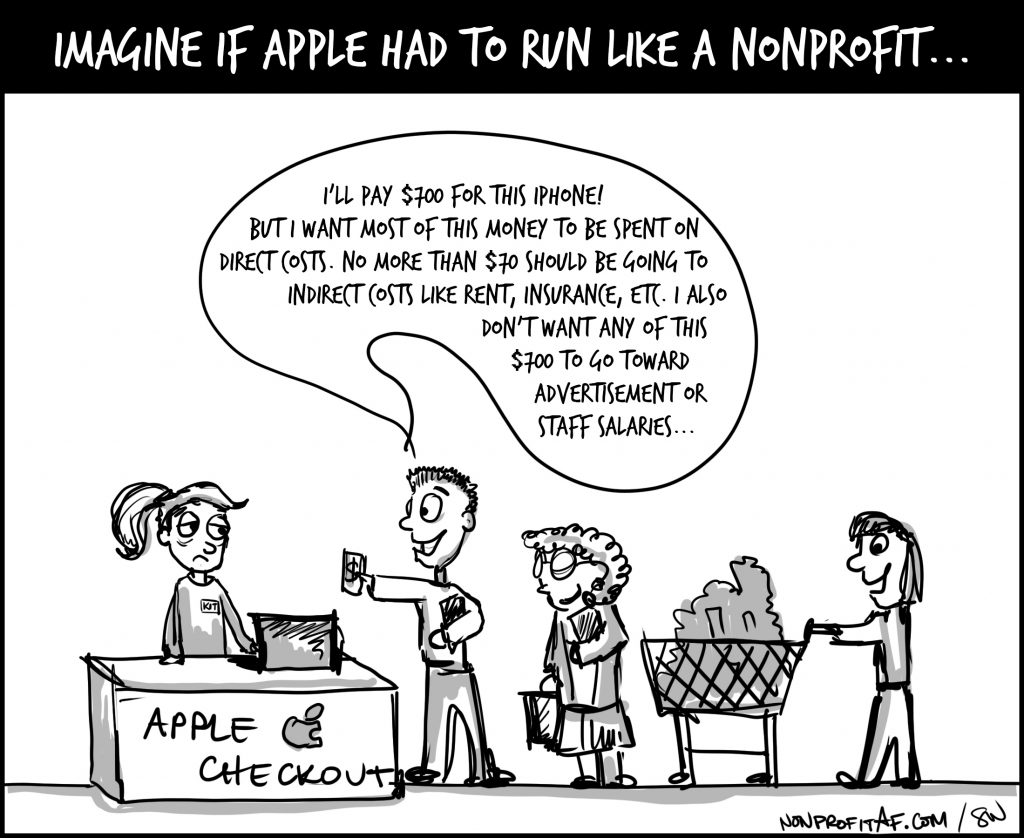
Imagine if Apple had to run like a nonprofit

We nonprofits deal with unique challenges that our for-profit colleagues never have to think about. If you ever sat in the dark for hours listening to REM and eating Otter Pops and wondering what it would like for a large for-profit like Apple to have to run like a nonprofit, wonder no more! I’ve done it for you this week! (What, like your vacation is so much more interesting). And I asked NAF’s web designer and artist, Stacy Nguyen, to draw up some comics.
At the retail store
Customer: Hi, I’d like to buy this latest iPhone. How much is it?
Apple employee: $700 dollars.
Customer: Here you go. But I want most of this money to be spent on direct costs. No more than $70 should be going to indirect costs like rent, insurance, etc. I also don’t want any of this $700 to go toward advertisement or staff salaries.
Apple employee: We’ll designate these restrictions in our systems.
Customer: At the end of the year, I’d like a report on what you spent this money on.
Apple employee: We provide quarterly financial reports, and would be glad—
Customer: No no no. I don’t want the financial reports on your entire company. I only want a report on what my $700 specifically was spent on. Only my $700.
Apple employee: OK…Would you like to be added to our e-newsletter list?Continue reading →
The Stigma Against Fiscal Sponsorship Needs To End

So, you think nonprofits should be taxed

Here’s a comment someone made on one of my posts: “If nonprofit is an industry sector, then it is time to start taxing it.” (They also added, in response for my call for the sector to pay our people better: “If you own your own company, and you control the finances, go ahead, pay people more just because. On the other hand in the real world, you sound like a fool on this point.”)
From the tiresome memes and ignorant, bizsplainy blog posts and comments out there, I think some members of the public have this image of nonprofit folks as mustache-twirling con artists sitting at our desks counting piles of gold coins while starving children with trembling eyes beg us in fear for more gruel. “Mooooore?!! Only 2 cents of every dollar is available to purchase gruel, and we’ve spent it all this month!”Continue reading →
Disorganized colleagues, stop feeling bad and own your chaotic brilliance!
 [Image description: Two wombats eating from a metal bowl. There’s a large wombat, and a cute little baby wombat. The’re both dark brown. The bowl has vegetables–looks like corn and carrots and half a green apple. Image obtained from Pixabay.com]
[Image description: Two wombats eating from a metal bowl. There’s a large wombat, and a cute little baby wombat. The’re both dark brown. The bowl has vegetables–looks like corn and carrots and half a green apple. Image obtained from Pixabay.com]Hi everyone. As usual I procrastinated in writing this blog post—look, House of Cards season five is not going to binge-watch itself while eating an entire container of vegan chocolate ice cream. I don’t know how this blog post will turn out or whether it will include pictures of wombats for some reason. (Update: It definitely includes a picture of wombats).
Since the beginning of time society has had a bias toward the Type-A individuals, they with their to-do lists, and their “bullet journals,” and their “inbox zero,” and their “daily flossing.” We tend to look down upon the disorganized, equating cleanliness with godliness, and having other sayings related to being neat and orderly. These messages have been pushed so hard that those who are disorganized in their work and personal lives are left feeling like crap.Continue reading →

